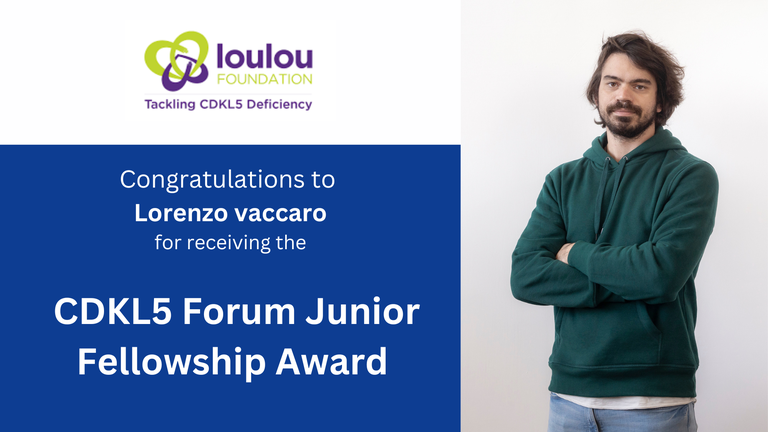Lorenzo Vaccaro Awarded 2024 CDKL5 Forum Junior Fellowship for Groundbreaking Research on Rare Neurodevelopmental Disorder
Nov 15, 2024

Lorenzo Vaccaro, a brilliant ypostdoctoral feelow in the lab of Davide Cacchiarelli at the Telethon Institute of Genetics and Medicine (TIGEM), has recently been awarded the prestigious 2024 CDKL5 Forum Junior Fellowship Award by the LouLou Foundation. This recognition underscores his contributions to studying CDKL5 Deficiency Disorder (CDD), a rare neurodevelopmental condition caused by mutations in the CDKL5 gene. The award highlights both his research’s promise and the critical need for deep molecular insights into rare genetic disorders like CDD, where limited patient populations and sparse molecular knowledge make finding targeted treatments especially challenging.
CDKL5 Deficiency Disorder (CDD) affects about 1 in 40,000–60,000 live births and is associated with severe early-onset epilepsy, motor impairments, and cognitive disabilities. The CDKL5 gene plays a vital role in neural development, but its exact molecular function remains elusive. The loss of its function disrupts crucial signaling pathways in the brain, but the specific disease-driving mechanisms are still poorly understood. Lorenzo Vaccaro’s work addresses this gap, contributing to the fundamental research needed to unravel the molecular underpinnings of CDD, with the ultimate goal of finding actionable targets for therapy.
Vaccaro's research focuses on pioneering high-throughput methods to analyze thousands of potential mutations in disease-driving genes such as CDKL5. His approach aims to overcome the typical challenges faced in rare disease research, namely, limited patient data and the high cost of comprehensive genetic analysis. To do this, Vaccaro has developed a multiplexed tool capable of screening a vast array of mutations in a cost-effective and scalable way. This method enables researchers to assess the impact of each mutation at a single-cell level, providing a granular view of how specific genetic changes affect cellular function.
What sets Lorenzo’s work apart is his team’s expertise in neurodevelopmental systems, positioning them to apply their innovative tools to CDD effectively. By generating a comprehensive dataset of CDKL5 mutational effects, Vaccaro’s research could serve as a cornerstone for understanding the disease at its core molecular level, bridging the gap between genetic mutation and observable disease traits. This knowledge is essential not only for identifying the mechanisms of CDD but also for finding pathways that could be targeted by novel treatments.
The research will be conducted at TIGEM, a leading European center dedicated to studying rare genetic disorders. TIGEM’s focus on basic science to uncover the molecular basis of diseases aligns perfectly with Vaccaro's work. Basic research in rare diseases is often the stepping stone toward the development of new treatments, especially in the current genomics era, which enables scientists to delve into the molecular foundations of diseases like never before. However, for ultra-rare syndromes like CDD, research remains constrained by the limited availability of patient data and the need for cost-effective, high-resolution tools to study mutation effects. Vaccaro’s work addresses these challenges directly, promising to generate invaluable insights into CDKL5 and create new possibilities for targeted treatment approaches.
This award not only celebrates Vaccaro’s contributions to advancing CDD research but also highlights the importance of investing in foundational scientific research, particularly for conditions where knowledge gaps still prevent effective treatments. As he pursues this pioneering research at TIGEM, Vaccaro’s work embodies the institute's mission to explore the molecular mechanisms underlying genetic diseases, striving to bring hope and novel therapies to patients affected by rare and ultra-rare conditions worldwide.
